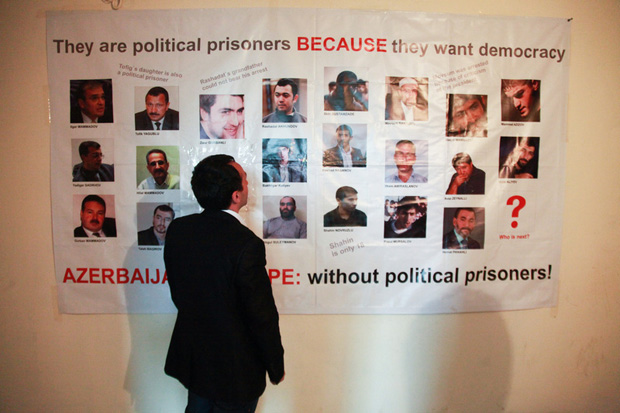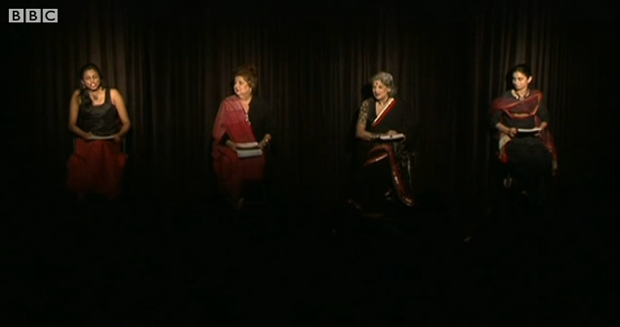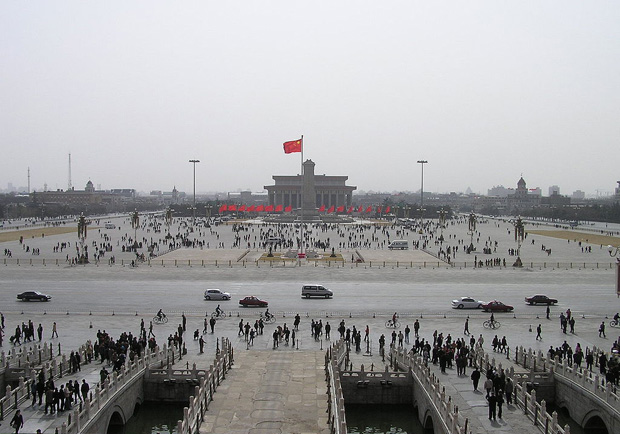27 May 2014 | Azerbaijan, Azerbaijan News, Politics and Society

(Image: Aziz Karimov)
An Azerbaijani journalist and blogger has been sentenced to five and a half years imprisonment after publishing posts deemed critical of the authorities on Facebook. Abdul Abilov, who runs the Facebook page “Stop sycophants!” was charged with illegal possession, storage, manufacturing or sale of drugs at the Baku Serious Crimes Court. The social media page was closed down shortly after his arrest.
Emin Huseynov, chairman of the Institute for Reporters’ Freedom and Safety (IRFS), is deeply concerned by the sentencing of journalists and bloggers in Azerbaijan, especially as the country has recently been handed chairmanship of the Committee of Ministers for the Council of Europe, a post Azerbaijan will hold for the next six months.
“Today’s harsh conviction shows once again the extraordinary measures that authorities are willing to take to crush criticism of their repressive policies, inconsistent with the country’s chairmanship of the Council of Europe,” Huseynov said in a statement. The IRFS has also called on the Council to “immediately appoint a special rapporteur on political prisoners in Azerbaijan” to analyse the situation in the country as well as raising the issue to the Parliamentary Assembly.
Abilov joins the eight journalist and seven bloggers and online activists already serving time in jail in the country for politically-motivated convictions, including the recent sentencing of the independent newspaper website editor Parviz Hashimli. And it’s not just journalists who are coming under fire from the authorities. Early May saw the sentencing of eight young activists on charges of attending to “cause public disorder”.
This article was posted on May 27, 2014 at indexoncensorship.org
27 May 2014 | India, News and features, Politics and Society, Religion and Culture

The Vagina Monologues performed in Mumbai in 2013 (Photo: BBC News)
“If Chennai doesn’t have vaginas, it is full of a#*holes!” quipped Mahabanu Mody Kotwal in the opening act of The Vagina Monologues when it was staged in Mumbai. The veteran theatre actor and director had good reason for using the pun. In December 2010, when the play was to be staged in the city for the first time, the Police Commissioner played spoilsport at the eleventh hour and declined permission. Earlier this year, a play on the Partition of India wasn’t allowed to be staged in Bangalore, and yes, Chennai. In both cases, it was the police which called the shots in the cancellations. Theatre’s subversive and liberating potential is renowned, and governments the world over have never held themselves back from wielding the censor’s bludgeon, but in India, it is the police which has been vested with remarkably sweeping powers to crack down on theatrical performances.
However, Chennai’s travails might well be over because in January this year, the Supreme Court struck down those provisions of the legislation – The Tamil Nadu Dramatic Performances Act, 1964 which permitted the cops to be the sole arbiters of “suitable” drama in the first place.
The roots of this legislation go back to the days when India was under British rule and the colonial administration remained constantly paranoid about “the natives” being up to mischief. Their fears were precipitated in 1876, when a Bengali play “Neel Darpan” (A Mirror to Indigo) was staged in Calcutta and got a rousing response, even from many Englishmen. The play narrated how farmers in Bengal and other provinces were being forced to cultivate indigo, and if they refused, were meted out the most terrible of punishments. This made the livid rulers who termed the play “scurrilous”, enact a law “to empower the government to prohibit certain dramatic performances”. The stated object of this law was to “prohibit Native plays that are scandalous, defamatory, seditious, obscene, or otherwise prejudicial to public interest”. Of course, “otherwise prejudicial to public interest” was left undefined, further empowering the censors.
It was hoped that independence would free drama from the shackles of this repressive law, but the reverse happened. Different states in India brought in their own legislations to control theatre, and most of them tightened the grip more than the British ever did.
For instance, the present legislation was geared towards proscribing “objectionable” plays and pantomimes. Section 2 (1) defined “objectionable” as anything which was likely to:
be seditious
(i) incite any person to commit murder, sabotage or any offence involving violence; or
(ii) seduce any member of any of the armed forces of the Union or of the police forces from his allegiance or his duty, or prejudice the recruiting of persons to serve in any such force or prejudice the discipline of any such force;
(iii) incite any section of the citizens of India to acts of violence against any other section of the citizens of India;
(iv) is deliberately intended to outrage the religious feelings of any class of the citizens of India by insulting or blaspheming or profaning the religion or the religious beliefs of that class;
(v) is grossly indecent, or is scurrilous or obscene or intended for blackmail; and includes any indecent or obscene dance.”
Thus, one is left in no doubt that the only form of ‘non-objectionable’ theatre would be bland, pantomimes extolling the virtues of mythology and religion; even then, one could never be sure, because religious sentiments in India are nothing short of a communal tinderbox.
If these antediluvian definitions weren’t enough, the police could act against the producer, director, troupe, and even the person who either owned or let out the premises where the play was to be staged. And there lurked the gravest danger- carte blanche powers of pre-censorship. Scripts of plays were to be submitted to the police for approval, and even though an opportunity of hearing was provided before the final call could be taken, it was hollow formality because the history of the legislation’s implementation proves that permission was granted only when the director or the playwright agreed to some of the mandated excisions.
In fact, the government was so unwilling to relinquish control that it told the Court of its willingness to appoint an officer to “guide the police commissioner in the cultural nuances” since literary sensibilities aren’t usually policemen’s forte!
The Supreme Court has broken the police’s stranglehold in Tamil Nadu; the time is ripe for challenging similar laws proscribing dramatic performances in other states and restoring to theatre the freedom it always deserved.
This article was posted May 27, 2014 at indexoncensorship.org
23 May 2014 | Counter Terrorism, Digital Freedom, Guest Post, News and features
Censorship is central to the current debate on how to counter extremism online. With fears intensifying over the potential impact of returning foreign fighters and potential ‘lone wolf’ terrorists, governments are increasingly targeting the Internet as a source of radicalisation. However, using negative measures such as censorship only attack the symptom rather than the array of its causes. Findings from our recent Quilliam report show that censorship initiatives not only prove ineffective in tackling extremism, but are potentially counter-productive.
Governments still rely largely on negative measures (such as filtering, blocking and censoring) when tackling extremist content on the Internet. Yet censorship has never been the solution and nor will it be. The debate around what content is legal and illegal online, and how authorities should deal with it, is sensitive and has brought up a range of questions in the last ten years as the Internet has expanded, changing the way we communicate, educate and socialise.
Across Europe, filtering Internet traffic with a view to blocking access to unwanted content has generated discussions of free speech and the legality of censorship. While some filtering is currently nation-specific (France and Germany filter and block content that is related to Nazism or Holocaust denial), other filtering trends are EU-level initiatives (such as the filtering and attempted eradication of Child Sexual Abuse Imagery – CSAI). Although no one is likely to argue for the continuation of CSAI-related content, there is a much broader debate to be had around the subject of what to do with so-called ‘extremist content’.
British and French governments have set up online portals in recent years allowing the public to anonymously report potentially illegal websites and materials. The UK’s Counter Terrorism Internet Referral Unit (CTIRU), for example, runs an official portal allowing individuals to submit ‘online terrorist material’ which is subsequently reviewed and flagged to Internet Service Providers (ISPs). The CTIRU has, thus far, removed over 29,000 pieces of illegal terrorist propaganda in the last three years.
While this number might sound high to some, it pales in comparison to the amount of illegal content online, which continues to grow exponentially. Furthermore, it is more or less impossible to calculate the true quantity of content that might fall under specific guidelines of illegality, and it is even more difficult to try and quantify content that might be deemed ‘extremist’.
Even if this were a possible route for eliminating unwanted content, the fact of the matter is that the most potent forms of online extremism are not taking place on static websites or platforms (the principal platforms that filtering initiatives target). It shouldn’t come as a surprise that, following mainstream social trends, extremist organisations and their supporters are most effective and active on social media platforms, which are more difficult to target through filtering systems as well as being more temporal, so that once a conversation has been had, or a video shared, filtering does little to obstruct the message being disseminated.
Furthermore, the blocking or censoring of material is also ineffective in ensuring that the same unwanted content will not reappear. Websites can change domain names, content can be re-posted, and the discourse around a given subject can take place elsewhere. However, even if we could find a way to rid the web of unwanted content we deem as extremist, the question remains as to whether or not we should.
While government portals such as the CTIRU site provide an outlet for the public to alert officials about material they believe to be illegal, there is significant dispute over what can be deemed extremist and worthy of filtering. The adoption of an agreed definition of extremism continues to be deeply problematic.
Terrorism, and terrorist-related content, is grounded in a well-defined legal structure that is articulated through the UK’s Terrorism Acts, as well as those of other countries. As such, any material which promotes terrorism, encourages individuals to enact violence against others and/or supports a terrorist organisation is deemed illegal in the UK, whether on-, or offline. However, ‘extremist material’ is a much contentious subject matter, remaining, ultimately, in the realm of ideas. We should not look to expand the already broad definition of terrorism to include extremism, and must recognise that the two phenomena, though related, are distinct, and, as such, require distinct responses.
Governments should continue to target content that falls squarely within their legal guidelines, even if the negative measures imposed will never fully abolish illegal content. Engagement with, and access to, extremist online content also informs the work of counter-extremist organisations that can use this information to develop counter-speech. Online counter-extremism should be civil society-led as the internet is in the realm of self-regulation; we should contest this ungoverned space rather than attempt to censor it.
Some groups have already established online platforms to develop counter-speech and counter-extremist content; such platforms include websites like Islam against Extremism, Radical Middle Way and the YouTube channel set up by the Against Violence Extremism network. However, movements like these need far more support and constant updating. We need to encourage counter-extremism practitioners, community groups and local actors to contest online space and promote the same positive messages online as they do offline. This is already being done to an extent, by the likes of the US State Department’s Twitter account, @thinkagain_DOS, which directly challenges terrorist narratives online; Abdullah X, an online graphic novel that aims to make counter-extremism more fashionable than jihadism; the Google Ideas-run AVE Network, which acts as a resource to help us learn from the mistakes of former extremists; and finally, us at Quilliam, an organisation that works to hone the arguments with which to refute extremist ideologies, challenges their Manichean narratives and promotes pluralism within British Islam as an antidote to extremism.
These are just four ways that have been identified, but there are undoubtedly many more. Using such methods, we can effectively inhibit the capability of extremist narratives to monopolise online platforms which are, now more than ever, the defining spaces of public debate and expression.
This article was posted on May 23, 2014 at indexoncensorship.org
23 May 2014 | China, News and features

(Photo: Yo Hibino/Wikimedia Commons)
“Keep quiet and carry on” is the slogan that can best describe China’s take on the approaching 25th anniversary of the 1989 Tiananmen Square massacre.
This is the yearly Tiananmen anniversary crackdown, and people within China know what to expect; slower internet, blocked search terms, more military personnel in public and the arrest of high profile individuals. But this year’s crackdown appears particularly thorough, either a reaction to dissent being higher than usual or a perception that it is in light of the milestone anniversary.
The Chinese government has already jailed scores of lawyers, activists and intellectuals, sending a chilling message to any other would-be agitators. Of the most widely reported was the arrest of Pu Zhiqiang, a prominent human rights lawyer who helped organise the 1989 protests. His detention came three days after he joined a private panel discussion on the massacre. Around 15 people were at the event, five of whom have since been detained. Then there was the airing of confessions on state media by journalist Gao Yu and citizen journalist Xiang Nanfu this May, which echoes Maoist propaganda tactics.
As we get closer to 4 June actions against freedom of expression will grow. Yvonne Shen, who is Asia News Digest Editor at Freedom House, an NGO committed to tracking violations to free expression, says the Chinese government “step up their censorship efforts in the days surrounding that date”. Within a week the organisation anticipate spikes in suspicious activity online. They are keeping a close eye on social platform WeChat in particular, given its current popularity.
“There was a leaked document dated 31 May, 2011, from the Beijing Municipal Government, that suggested the authorities had launched a ‘wartime coordination mechanism’ that required all units to report suspicious information during the “sensitive period,” Shen tells Index of the government’s usual tactic.
China forbids open discussion of the Tiananmen Square crackdown, in which soldiers fired on crowds of unarmed pro-democracy protesters, killing hundreds if not thousands (no official death toll has ever been released). On top of arrests, an army of censors work overtime to ensure mentions of the event are quickly removed. Sites are blocked and words that allude to or directly reference it vanish.
The private realms of emails and direct messages are also monitored, as Louisa Lim, author of upcoming book The People’s Republic of Amnesia, Tiananmen Revisited, describes: “I wrote my book on a brand-new laptop that had never been online. Every night I locked it in a safe in my apartment. I never mentioned the book on the phone or in e-mail, at home or in the office — both located in the same Beijing diplomatic compound, which I assumed was bugged.”
Chinese journalists are trained “not to ever touch Tiananmen with a 10 foot pole,” Beijing-based journalist Eric Fish tells Index. He too perceives a recent shift: “The atmosphere for Chinese journalists has tightened quite a bit in general since Xi Jinping came to power. It feels like they’ve clamped down a lot more than normal in the lead-up to this anniversary.”
As Fish says, the detentions form part of a broader crackdown on free speech. When Xi Jinping came to power in 2012, there were hopes he would relax censorship. These hopes were quickly dashed. Index recently reported on a ban of seemingly innocent US TV shows, which shows just how pervasive the attack has been.
Even foreign journalists, who are usually granted more leeway, have experienced “a big uptick in pressure over the past two years,” says Fish, a reference to several prominent cases of journalist visas being revoked.
This is a fact Steven Levine has had to accept. “I anticipate being refused a Chinese visa the next time I apply to visit China as this is one way in which the Chinese authorities punish foreigners who criticise their human rights practices,” explains the retired professor of Chinese history and politics, who coordinates the Tiananmen Initiative Project — an individual effort aimed at focussing attention on the Tiananmen Movement and government crackdown.
Levine’s project has already been banned from the Chinese online world; within days of launching last November, the site had been blocked. Levine will not be deterred and continues to correspond with Chinese individuals inside the country, as well as with exiled Chinese who were either leaders or active in the 1989 movement. For him, being refused a visa is a price worth paying. It’s a different story for those inside of China, who take a much bigger gamble.
That said many have come up with creative ways to circumvent censorship. For example, prominent writer Murong Xuecun avoided the censors by using the politically neutral word “tractors” instead of the highly provocative “tanks”. And while “4th June” is blocked, the new code of “May 35th” has filled its place — a count of that month’s 31 days plus four in June.
It’s a game of cat and mouse. Ultimately, the cat is winning, but the mice aren’t going down without a fight.
This article was posted on May 23, 2014 at indexoncensorship.org




